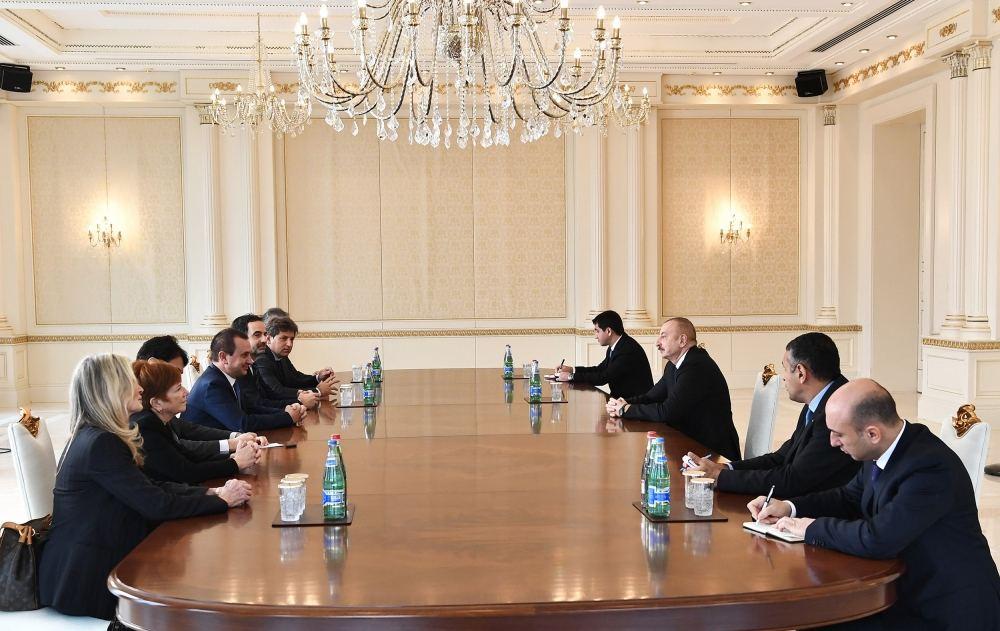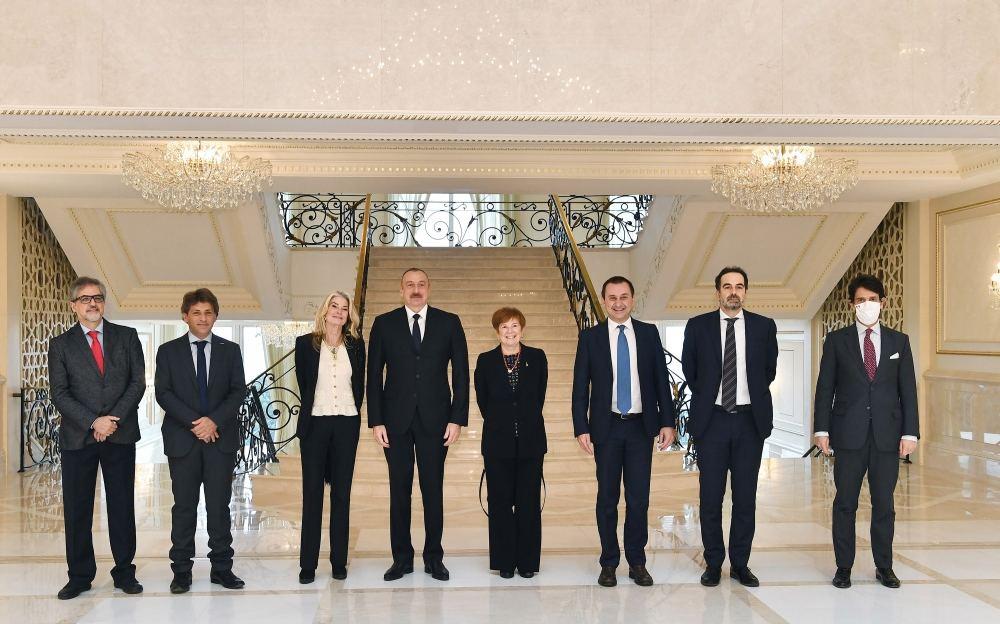Companies from friendly countries to be involved in restoration in Azerbaijan's liberated lands [UPDATE]
![Companies from friendly countries to be involved in restoration in Azerbaijan's liberated lands [UPDATE]](https://www.azernews.az/media/2020/12/07/erjgfojeiqwdqwef4f1.jpg)
By Vafa Ismayilova
President Ilham Aliyev has said that Azerbaijan has launched new infrastructure projects to reconstruct the territories liberated from Armenia's 30-year-old occupation and companies of friendly countries will be involved in the restoration work.
Aliyev made the remarks while receiving the delegation led by Vice-President of the Italian Chamber of Deputies Ettore Rosato on December 7.
“A restoration period is now setting in. Large-scale construction work will be carried out. Of course, first of all, Azerbaijani companies will take part in this work, and we will invite companies from countries that are friendly to us. Rather, we have already invited them,” Aliyev said.
The president said he would like Italian companies to take an active part in the restoration and reconstruction work, adding that relevant proposals have already been made to the Italian side and preliminary contacts will be established via a videoconference in the coming days.
“I want to say again that companies from friendly countries will take part in this work. And true friendship manifests itself in difficult times. For us, this war also showed who the real friends of Azerbaijan are, which countries. We are people who value friendship. Your visit to Azerbaijan once again shows that Italy is a true friend of Azerbaijan.”
President Aliyev said that a new era is beginning for Azerbaijan as the country liberated its Armenian occupied-regions during the war that lasted from September 27 and November 10.
“We will rebuild all those regions. Preliminary steps have already been taken and initial infrastructure projects have been launched.”
Furthermore, Aliyev spoke about destruction in recently-liberated Azerbaijani territories and the war crimes committed by Armenia in the Azerbaijani territories in the past three decades.
“There is not a single safe building left in Fuzuli and Jabrayil cities. Zangilan and Gubadli are in the same situation. The Armenian state has pursued a policy of illegal settlement in Kalbajar and Lachin districts. This is a war crime, a step that runs counter to Geneva Conventions. Some houses remain in some settlements in these districts. They were inhabited by Armenians.”
The president reminded that Armenians continued committing war crimes in Azerbaijani lands even from 10 November to 1 December, the time in which they had to leave these districts in line with the trilateral peace agreement that ended the war and stipulates the return of Azerbaijani regions.
“They also committed atrocities there, burning and demolishing houses. Those houses were not built by them, but by the Azerbaijanis who lived there 30 years ago. They burned the forests and cut down trees. In other words, they committed atrocities right in front of the eyes of the whole world. International media have also reported on this. The whole world saw what vandals Azerbaijan was facing and managed to restore its territorial integrity by waging a war against these vandals on its own.”
Furthermore, Aliyev thanked the visiting senior Italian MPs for inspecting Armenian war crime scenes in the newly-liberated Aghdam region and the country's second largest city of Ganja subjected to Armenian missile strikes in October.
"I would like to thank you for visiting both Ganja and Aghdam and witnessing the war crimes committed by the Armenian state. War crimes committed by Armenia are obvious. While suffering a defeat on the battlefield, Armenia fired on civilians. They fired at Ganja with ballistic missiles from the territory of Armenia. This is a war crime, and the Armenian leadership will be held accountable for this crime.”
The president stressed that 94 civilians were killed and over 400 were injured in Armenia's armed attacks during the war. He said that the missile attacks were not accident and pursued the end of killing more people.
"It was deliberately aimed at civilians at night so that there would be more casualties. You also saw the city of Aghdam. As a matter of fact, there is nothing left of the city, all the buildings have been destroyed. This is a crime that shows the ugly face of Armenian fascism. They thought that the Azerbaijanis would never return to these lands. But we returned and drove them out of our lands,” he added.
Commenting on his delegation's visits to Ganja and Aghdam and on the Armenia’s destruction in those cities, Vice-President of the Italian Chamber of Deputies Ettore Rosato said: “It is actually difficult to believe that people used to live there.”
At the meeting, the president said that this visit by the Italian delegation was the first one from Europe after the 44-day war and he explained this with the presence of high-profile relations between Italy and Azerbaijan.
Aliyev stressed numerous significant documents were signed as part of his visit to Italy in early 2020.
“Many important documents were signed during that visit, including the Multidimensional Strategic Partnership document. This document reaffirmed our strategic partnership again. Many important issues were discussed during my meetings with both the President and the Prime Minister. At the same time, my meetings with the leaders of the Senate and the House of Representatives were very positive,” Aliyev said.
The president hailed the high level of ties with Italy in the political, economic and some other spheres and underlined the Italian president's visit to Azerbaijan in 2018.
“Italy is Azerbaijan's first trading partner. Last year, our turnover reached $6 billion. Most of it is related to energy resources but I think that the non-oil sector will also have a special place in the coming years. As for the energy sector, as you know, the TAP project will be launched in the near future, which will undoubtedly further strengthen Italian-Azerbaijani relations.”
The 44 days of war in and around Nagorno-Karabakh ended with the Russian-brokered peace deal signed on November 10 by the Azerbaijani, Russian and Armenian leaders. Under the peace agreement Azerbaijan’s Kalbajar, Aghdam and Lachin regions were vacated by the Armenians by December 1. The agreement also envisages the return of Azerbaijani IDPs to Azerbaijan’s Nagorno-Karabakh and the seven adjacent regions under the control of the United Nations High Commissioner for Refugees.
The clashes between Armenia and Azerbaijan resumed after Armenia launched large-scale attacks on Azerbaijani forces and civilians on September 27. Five Azerbaijani civilians were killed in the first day of the Armenian attacks. Over 90 Azerbaijani civilians were killed in Armenian's indiscriminate attacks on Azerbaijani civilians. Azerbaijan launched counter-offensive operations that ended in the liberation of over 300 settlements, villages. Azerbaijan also liberated five city centres and the historic Shusha city that was liberated on November 8.
The peace agreement ended the 30-year-old conflict between Baku and Yerevan over Azerbaijan’s Nagorno-Karabakh region that along with the seven adjacent districts came under the occupation of Armenian armed forces in the war in the early 1990s. For about three decades, Armenia failed to implement the UN Security Council resolutions demanding the withdrawal of the Armenian troops, which was the main obstacle to the resolution of the conflict.
Here we are to serve you with news right now. It does not cost much, but worth your attention.
Choose to support open, independent, quality journalism and subscribe on a monthly basis.
By subscribing to our online newspaper, you can have full digital access to all news, analysis, and much more.
You can also follow AzerNEWS on Twitter @AzerNewsAz or Facebook @AzerNewsNewspaper
Thank you!


